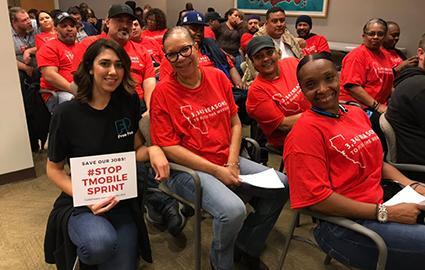Washington, DC - This week, Californians expressed their concerns about the impact of the proposed T-Mobile/Sprint merger at the California Public Utilities Commission’s (CPUC) public participation hearings in Fresno, Los Angeles, and San Diego. CWA members and allies from state and local consumer, labor, and community organizations explained that the merger would mean lost jobs and reduced wages for California workers, while increasing prices for California consumers, especially low-income consumers.
As the San Diego Union-Tribune previewed ahead of the final CPUC hearing:
“Possible job losses -- along with the specter of higher prices and harm to low income, minority and rural consumers -- are key concerns of opponents of the deal. The Build Better San Diego Coalition; Interfaith Worker Justice of San Diego County; the San Diego and Imperial Counties Labor Council and other groups said they would attend the San Diego event.
...An analysis by the Communications Workers of America estimates the merger would result in the closure of 902 retail stores in California and eliminate 3,342 jobs statewide. Nationwide, the CWA projects the merger would result in the loss of 30,000 jobs. Citing economists, the union contends the deal would boost consumer prices up to 15 percent for month-to-month subscribers and 9 percent for multi-year contract subscribers.
The union is urging regulators to reject the deal unless T-Mobile commits that no workers will lose their jobs as a result of the merger, that overseas call center jobs will be returned to the U.S. and that worker rights to unionize will be honored.”
The Fresno Bee covered a press conference ahead of the first CPUC hearing, writing:
“About two hours before the public hearing, several representatives of community organizations stood outside city hall in opposition. They all agreed that low-income consumers will suffer if the merger is approved.
Thomas Runnion, vice president of the Communication Workers of America in District 9, said whenever companies merge, the CWA looks at the impacts on consumers and workers.
“In both cases, this merger is not good for either of these entities,” he said. His organization says there will be a loss of 30,00 workers nationwide, with 3,300 in California and 73 in Fresno. Consumer costs will also increase 15.5 percent.
Samuel Molina of Mi Familia Vota said he is worried about the effects on the Latino community with rising costs. Sprint, T-Mobile, and their prepaid brands Boost and MetroPCS “are widely used by our community and communities of color. This will severely limit the Latino community’s access to internet.”
According to Thomas Runnion, CWA District 9 Vice President, “Throughout this week, California regulators heard directly from local community leaders, consumer advocates, and workers who detailed why the proposed T-Mobile/Sprint merger would be bad news for our state. The merger, as presently constructed, would eliminate more than 3,300 state jobs while raising prices for T-Mobile and Sprint customers, especially cost conscious customers who choose pre-paid plans. The merger clearly fails the public interest standard and should be opposed by state regulators, elected officials, and anyone who cares about good jobs, fair wages, and price-conscious consumers.”
Additional Background
CWA report: “How the T-Mobile/Sprint Merger Will Impact California.” A report from CWA details what the proposed T-Mobile/Sprint merger would mean for California and the nation on the following topics: jobs and wages; low income consumers; Hispanic and African-American consumers; rural Americans; and national security.
CWA District 9 testimony to CPUC: proposed merger would result in “substantial public interest harm” and hurt California workers and consumers. On Monday, January 7, CWA District 9 submitted official testimony to the CPUC (available in full online here), including detailed analysis about how the merger would result in the loss of 30,000 jobs across the United States, including 3,342 jobs in California; reduce wireless workers’ wages in California; and increase consumer prices as much as 15.5 percent on the new T-Mobile’s prepaid plans and as much as 9.1 percent for postpaid plans. The filing also shows that the companies have failed to demonstrate how the merger would improve 5G build-out or improve rural offerings compared to standalone firms.
EPI/Roosevelt study highlights T-Mobile/Sprint merger would reduce California wireless workers’ wages: A recent paper by the Economic Policy Institute and Roosevelt Institute examined the labor market impact of the proposed T-Mobile/Sprint merger on retail workers who sell wireless equipment and services, finding in California the post-merger average annual earnings of retail wireless workers would decline by up to the following amounts in the below California metro areas:
Los Angeles: $2,906 decline in retail wireless workers annual earnings
San Francisco: $2,953 decline in retail wireless workers annual earnings
San Diego: $2,363 decline in retail wireless workers annual earnings
San Jose: $2,728 decline in retail wireless workers annual earnings
Sacramento: $2,319 decline in retail wireless workers annual earnings
Press Contact:
Beth Allen
[email protected]
202-434-1168
Amy Fetherolf
[email protected]
202-434-1168

